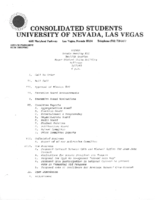Search the Special Collections and Archives Portal
Search Results

Meeting minutes for Consolidated Student Senate, University of Nevada, Las Vegas, March 13, 1982
Date
Archival Collection
Description
Text

Juliana Urtubey oral history interview: transcript
Date
Archival Collection
Description
Oral history interview with Juliana Urtubey conducted by Nathalie Martinez and Barbara Tabach on May 24, 2021 for the Latinx Voices of Southern Nevada Oral History Project. Born in Colombia, Julia was able to immigrate with her family to the United States when she was six years old. The family lived in Chicago, Illinois and later in Phoenix, Arizona. Juliana moved to Las Vegas in 2013 and taught learners with special education needs at the elementary level. In 2021, she was named the National Teacher of the Year, the first Latina and the only Nevadan to ever hold the distinction. Juliana personally received the award from Dr. Jill Biden. Subjects discussed include: Colombia, Chicago, Illinois, National Teacher of the Year, and bilingual education.
Text

Transcript of interview with Betty Bunch by Joyce Marshall, January 9, 1996, February 7, 1996, & February 13, 2002
Date
Archival Collection
Description
Betty [Rosenthal] Bunch began dancing as a child. By the time she was nine years old she decided she would have a dancing career. At 18 years she began to work in stock theatre productions. Within a short time, she had joined the Moro-Landis dancers. She landed her first job in Las Vegas in 1956 at the Sahara Hotel as part of the opening line for Donald O'Connor. Following the Sahara, she worked as a dancer at the Riveria, and then returned to the Moulin Rouge in Hollywood. In 1961 while vacationing in Las Vegas, she landed a job dancing at the Dunes. She continued to dance, sing and do comedy until after the birth of her second child. At that time, she retired from the Las Vegas showroom, but not from show business. Her involvement in both film and stage has remained rich and varied. This interview focuses on the time Betty spent performing on the Las Vegas strip, including her long involvement with the acclaimed afternoon show Bottoms Up. The interview provides information on workin
Text

Transcript of interview with Mary Ellen Campbell by Ronald Robinson, March 6, 1977
Date
Description
On March 6, 1977, Ronald Robinson interviewed Mary Ellen Campbell (born 1886 in Panaca, Nevada) about her life in Nevada. Campbell first talks about her parents’ move to the United States from England and her own life growing up in Panaca. She also talks about living in Pioche and the conditions of living in these two small Nevada towns. Also present during the interview is Mary’s grandson, Allen Campbell, who sometimes asks a few questions as well.
Text

Transcript of interview with Carl Ciliax by Gary Wood, March 8, 1980
Date
Archival Collection
Description
On March 8, 1980, Gary Wood interviewed Carl Ciliax (born 1941 in Las Vegas, Nevada) about his experiences living in Nevada. Ciliax first describes his family history, his early interests in wildlife, and his background and education in artwork. Ciliax then discusses his early experiences in hunting and his eventual interest in conservationism and preservation, including his involvement with organizations that sought the protection of desert bighorn sheep and the protection of wildlife in general. The two talk more about wildlife, the early development of Las Vegas, and the effects of the atomic testing. The interview concludes with Ciliax’s recollection of recreational activities and some of his thoughts on conservationism.
Text

Transcript of interview with Joyce Moore by Claytee D. White, January 22, 2013
Date
Archival Collection
Description
Joyce Moore's family moved to Las Vegas from Chicago in 1953, when she was eight years old. She attended Rancho High School, married and had three daughters, and currently lives in Las Vegas. Joyce's father was in the gaming industry and her mother was a nurse. Growing up in Las Vegas meant going to shows with her mother, spending summer days in the pool at the Showboat Hotel, and riding horses to the Last Frontier. While a teenager at Rancho High school, Joyce worked at several movie theaters including the Huntridge, went to school dances and marched in the Hellodorado Parade. After her divorce, Joyce returned to work to support herself and her children, first at the Daily Fax then later on the Strip at the Aladdin and Circus, Circus doing a variety of office and accounting jobs. As a lark she and a friend applied to work as cocktail waitresses at the MGM; she was hired and spent the next five years in a job that was by turns interesting, exhausting, frustrating and fun. This interview covers several periods of Joyce's life - her childhood, teen years, and early adult life - and what it was like to grow up, live and work in Las Vegas in from the mid-1950s until the mid-1970s.
Text

Transcript of interview with Sonja Saltman by Barbara Tabach, August 18, 2015
Date
Archival Collection
Description
Included in this oral history are reminiscences of Sonja Saltman's personal non-Jewish heritage in Austria, the importance of her grandmother in her life, and how she recalls becoming part of the Jewish community.
Sonja Saltman is a psychologist and philanthropist in Las Vegas, Nevada. She is executive director and co-founder of the Existential Humanistic Institute, a non-profit organization based in San Francisco, California that offers training in existential-humanistic therapy and theory. In 2003 Sonja and her husband Michael Saltman founded the Saltman Center for Conflict Resolution at the University of Nevada, Las Vegas (UNLV) William S. Boyd School of Law. The Saltman Center is focused on research, teaching, and public service related to "the advanced study of the nature of conflict and how to resolve it." A native of Austria, Sonja Saltman also serves as the Honorary Consul for Austria in Las Vegas. The Saltmans are involved with multiple charitable organizations and initiatives, both locally and abroad. Sonja Saltman has served on the boards of the Anti-Defamation League, Nevada Women's Philanthropy, and the Black Mountain Institute. Projects that the couple has supported include the rebuilding of homes and bridges is Bosnia, and Streetball Hafla, a basketball program to improve relations between Jewish and Arab teenagers in Israel. In 2014 Sonja and Michael Saltman were recognized as Distinguished Nevadans by the Nevada System of Higher Education. Included in this oral history are reminiscences of her personal non-Jewish heritage in Austrian, the importance of her grandmother in her life, and how she recalls becoming part of the Jewish community.
Text

Transcript of interview with Gilbert Shaw by Barbara Tabach, May 3, 2016
Date
Archival Collection
Description
In this interview, Gil Shaw recalls milestones at Congregation Ner Tamid?first bat mitzvah?and anecdotes about leaders, first rabbis, donation by Moe Dalitz, services being held in Protestant churches, and even a controversy over colors for the new temple building of Ner Tamid.
Text

Transcript of roundtable interview with the Holocaust Resource Center: Myra Berkovits, Susan Dubin and Doug Unger, by Barbara Tabach, September 4, 2014
Date
Archival Collection
Description
Interview with Myra Berkovits, Susan Dubin and Doug Unger of the Holocaust Resource Center. In this interview, the group discusses the beginnings of what is now the Sperling Kronberg Mack Holocaust Resource Center. Edythe Katz-Yarchever is discussed as the catalyst for establishing the center and getting others involved with the Governor's Advisory Council on Education Relating to the Holocaust. Berkovits talks about her role as a liason for Holocaust education in the Clark County School District and the student-teacher conferences held each year with funding from Sheldon Adelson. Unger discusses expanding the outreach to the Washoe County School District with assistance from Atlantis Hotel (Reno, Nev.) owner, John Farahi and Judy Mack. They talk about the previous locations of the Holocaust Resource Center on Maryland Parkway, then Renaissance Drive, and the affiliation with the Jewish Federation and the Jewish Family Service Agency. After funding and personnel issues around 2011, the advisory council and the library went through a re-structuring and hired Susan Dubin who organized and catalogued the library collection. The library is now accredited by the Association of Jewish Libraries.
Text

Transcript of interview with Dr. John Shepherd by Lisa Gioia-Acres, November 21, 2008
Date
Archival Collection
Description
Dr. John Richard Shepherd shares the background of his early life in southern Illinois, his father's and grandfather's occupations, and his educational journey through college and medical school. His army experiences in Chicago and Alabama convinced him and his wife to look for a warm dry climate in which to live, and they relocated to Las Vegas in 1968. Dr. Shepherd recalls the businesses and housing surrounding Sunrise Hospital, the difficulties getting his specialty listed in the phone book, and renting his first office space from Nate Adelson. He also describes taking out a loan to install ophthalmology equipment, hiring an office manager with medical accounting experience, and doing cataract surgery in a way that basically hadn't changed for decades. The passing of the Medicare bill back in 1966 caused Dr. Shepherd's practice to build up quickly. He details the many ways eye surgery changed, including the invention of the intraocular lens and the phacoemulsification procedure. He mentions his and Dr. Shearing's contributions to ophthalmology — better designed lenses and surgical techniques - which they taught to other doctors from all over the country. Dr. Shepherd discusses radial keratotomy, which was a precursor to laser and later LASIK surgery, and describes a lens implant technique he learned in Russia from Dr. Fyodorov. He goes on to share anecdotes and stories of his interactions with patients, his travels as a consultant and as a surgical teacher for Project Orbis, and meeting Fidel Castro. He speaks candidly about his successes and his failures as well. Dr. Shepherd retired in 2006 and immediately enrolled in a Master's program and earned a degree in military history. After a long and distinguished career, after receiving many accolades and awards, he and his wife are enjoying life, splitting their time between Sun Valley, Idaho, and Las Vegas.
Text
